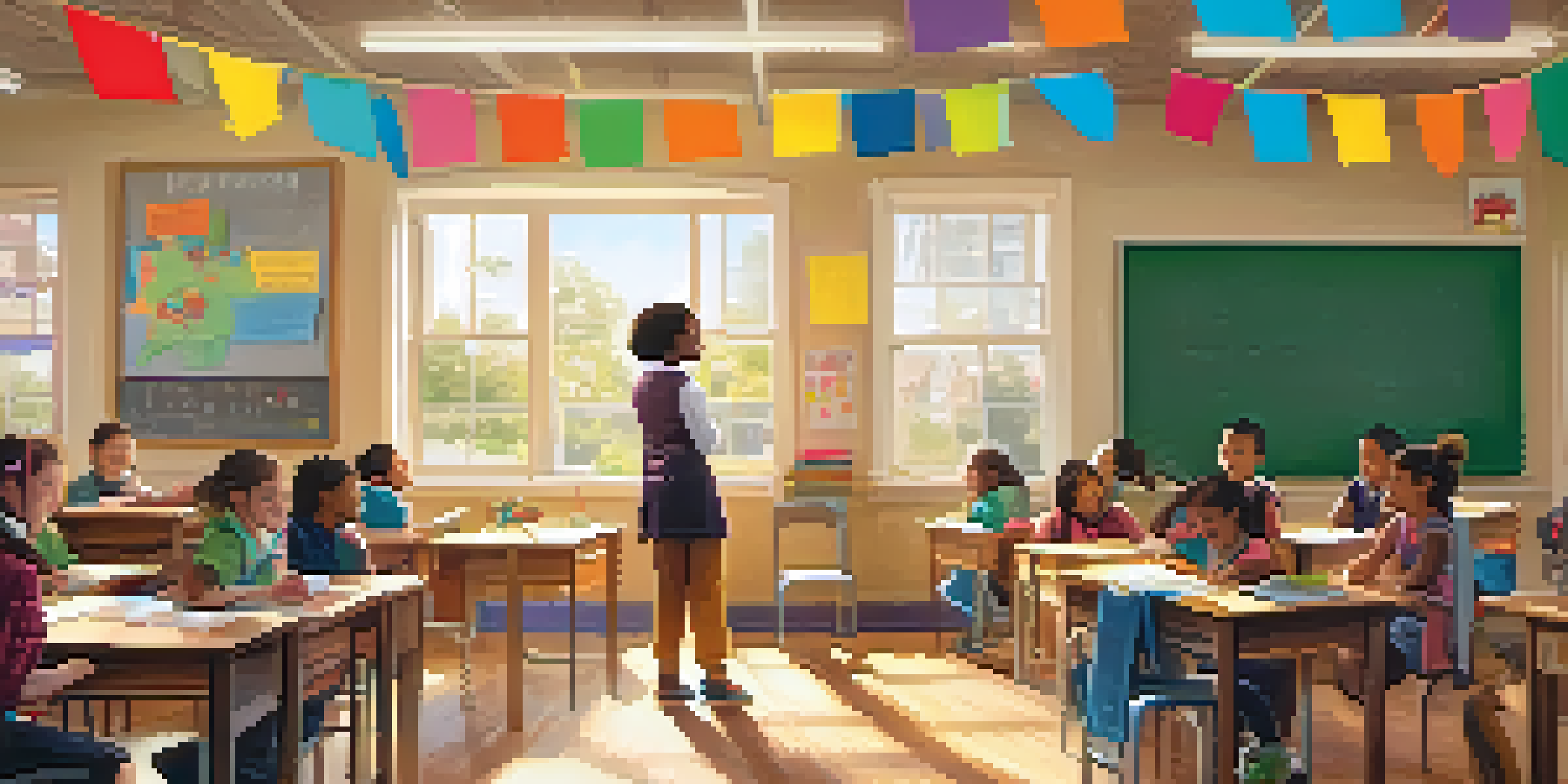The Role of Humor in Alleviating Teacher Stress and Anxiety

Understanding Teacher Stress and Anxiety
Teaching can be an incredibly rewarding profession, but it often comes with high levels of stress and anxiety. From managing classrooms to meeting curriculum demands, teachers juggle numerous responsibilities daily. This constant pressure can lead to burnout, impacting their well-being and effectiveness in the classroom.
Laughter is an instant vacation.
It's essential to recognize that stress isn't just an individual experience; it can affect the entire school environment. When teachers are overwhelmed, it can create a ripple effect, influencing student behavior and engagement. Understanding this dynamic is the first step toward finding effective coping mechanisms.
By acknowledging the sources of stress, educators can begin to seek out strategies that not only help them cope but also enhance their teaching experience. One such strategy that has gained attention in recent years is the use of humor.
The Science Behind Humor and Stress Relief
Humor has a unique ability to change our perspective on stressful situations. According to research, laughter triggers the release of endorphins, our body's natural feel-good chemicals. This biological response can help reduce stress and promote an overall sense of well-being, making it a powerful tool for teachers.

Incorporating humor into daily routines can also foster a more positive environment. When teachers use humor, they not only lighten their own mood but also create a space where students feel more comfortable and engaged. This can be particularly beneficial in a classroom setting where tension often runs high.
Humor Reduces Teacher Stress
Incorporating humor into teaching can alleviate stress and foster a positive classroom environment.
Moreover, humor can serve as a coping mechanism during challenging times. Just as a good joke can momentarily distract us from our worries, teachers who embrace humor can find relief from the weight of their responsibilities. This connection between laughter and stress relief underscores why humor is vital in education.
Creating a Humor-Friendly Classroom Environment
Establishing a humor-friendly classroom starts with the teacher's mindset. Educators who embrace humor are more likely to cultivate an atmosphere where laughter is welcomed, and creativity flourishes. This shift can lead to stronger relationships with students, which is crucial for effective teaching.
Humor is mankind's greatest blessing.
Simple strategies can help teachers infuse humor into their lessons. Whether it's using funny anecdotes, playful language, or humorous multimedia, these elements can make learning more enjoyable and memorable. By making lessons engaging, teachers can help reduce both their own anxiety and that of their students.
As teachers integrate humor into their teaching styles, they also model resilience and adaptability. This not only helps them cope with stress but also teaches students valuable life skills, such as the importance of perspective and finding joy even in difficult situations.
The Role of Humor in Building Teacher Resilience
Resilience is the ability to bounce back from challenges, and humor plays a significant role in fostering this trait. By finding the funny side of stressful situations, teachers can build a mental toolkit that aids in overcoming adversity. This resilience is crucial in a profession that often faces unexpected hurdles.
When teachers share humorous experiences, they not only lighten their own load but also connect with colleagues. Sharing laughs can create camaraderie among staff, helping them support one another during tough times. This strong support network can be invaluable in combating feelings of isolation and stress.
Building Resilience Through Laughter
Finding humor in challenging situations helps teachers develop resilience and connect with colleagues.
Furthermore, a resilient teacher is better equipped to inspire their students. When educators model a positive attitude and a sense of humor, they encourage their students to adopt similar mindsets. This can lead to a more optimistic classroom culture, ultimately benefiting everyone involved.
Humor as a Tool for Professional Development
Professional development doesn't always have to be serious. Incorporating humor into training sessions can make learning more enjoyable and effective for teachers. Engaging with material in a light-hearted way can help participants retain information and apply it in their classrooms.
Workshops that use humor can also encourage collaboration among educators. When teachers share laughs, they create a sense of community and openness, making it easier to exchange ideas and strategies. This collaborative spirit is essential for fostering growth and innovation within schools.
By embracing humor in professional development, schools can create a culture that values both growth and well-being. This approach can significantly reduce teacher stress and anxiety, leading to a more positive teaching experience overall.
Balancing Humor with Professionalism
While humor is a valuable tool, it's essential to strike a balance between lightheartedness and professionalism. Teachers must be mindful of their audience and ensure that their humor is appropriate for the classroom environment. This awareness helps maintain respect while still allowing for fun.
Effective humor often involves relatability and understanding the unique dynamics of the classroom. Educators should aim for humor that resonates with their students' experiences. This approach not only enhances engagement but also reinforces the connection between teacher and student.
Engaging Students with Humor
Using humor in lessons makes learning enjoyable, enhancing student engagement and academic performance.
Ultimately, the goal is to create a safe space where humor can thrive without undermining authority or respect. When teachers find this balance, they can use humor to alleviate stress while still maintaining a positive and productive classroom atmosphere.
The Lasting Benefits of Humor in Education
The benefits of incorporating humor into teaching extend beyond immediate stress relief. Teachers who use humor often report greater job satisfaction and improved relationships with students and colleagues. This positive ripple effect can transform the overall school environment, making it more enjoyable for everyone involved.
Moreover, students who experience humor in the classroom are more likely to develop a love for learning. When education is associated with laughter and joy, students are more engaged and motivated. This engagement leads to better academic performance and a more positive school experience.

In the long run, prioritizing humor in education contributes to a healthier, more resilient teaching profession. By fostering a culture that values laughter and connection, schools can combat teacher burnout and create environments where both educators and students thrive.